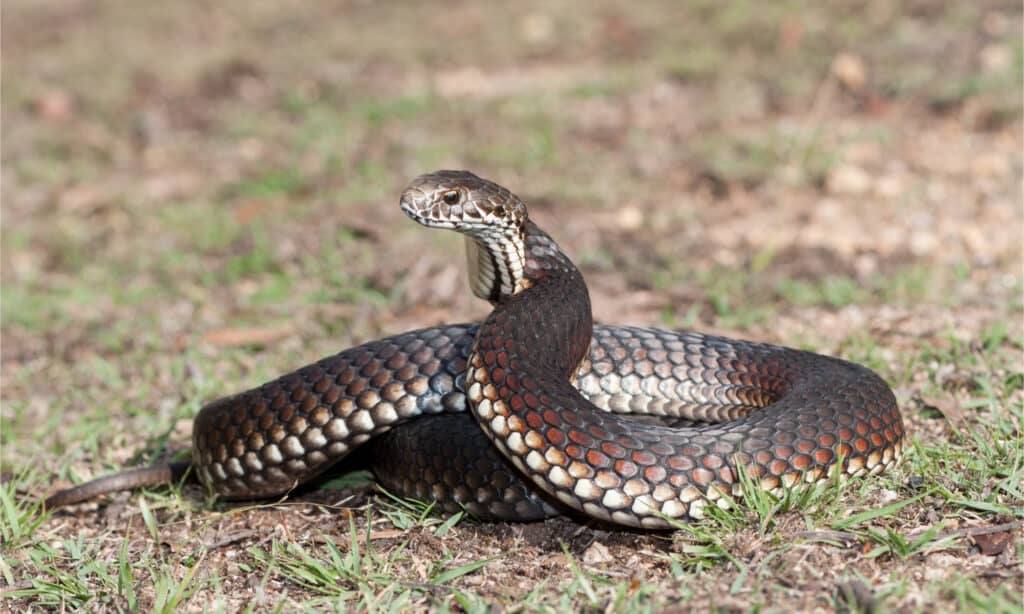Snakes are easy to identify due to their unique bodies. They have no limbs and crawl to move, and even more distinctively, some snake species are venomous. However, if you take a closer look at these reptiles, one unique facial feature, or the lack thereof, stands out from the rest; snakes do not seem to have any ears on their heads!
Their heads are usually round or triangular and are always ear-free. We’ve all believed that snakes can hear because they react to humans’ approach and loud sounds. But can snakes hear, or are they deaf? Do snakes have ears, or do they depend on some sort of sixth sense? And if they have ears, where are they located? Let’s get right into it.
Can Snakes Hear or Are They Deaf?

Black adders occasionally appear, they’re usually female.
©Simlinger/Shutterstock.com
Snakes aren’t deaf. They hear and react to loud noises or sudden sounds. Studies have further proven that a snake’s hearing accommodates sounds in the 80-600 Hz range- although some snakes hear up to 1000 Hz. For reference:
Do Snakes Have Ears?
Humans and most mammals have three major ear parts: the inner ear, the middle ear, and the outer ear. The part we can see and touch is the outer ear. However, a simple look at any snake will confirm it doesn’t have an outer ear. Instead, they have a single middle ear bone and an inner ear. The internal ear is responsible for processing sounds.
The middle ear transmits sounds to the inner ear through vibrations. Upon reception, the vibrations are turned into nerve impulses sent to the brain. This allows snakes to hear and detect prey or predators crawling toward them. However, as you might imagine, they aren’t great at picking up airborne sounds.
Can Snakes Hear You Talk To Them?

Samar cobra, Naja samarensis, a cobra from the Philippines.
©ccarbill/Shutterstock.com
Snakes can hear sounds in the 80-600 Hz range, and since the human voice ranges from 85 – 255 Hz, snakes can indeed hear when you talk to them. They might even be able to differentiate between your voice and someone else’s. However, this isn’t backed by research or any studies. This doesn’t mean that snakes cannot identify their owners. Snakes that have been in captivity for a long time can recognize the scent of their owners.
Can Snakes Learn Their Name?
Snakes are probably unable to learn their names. Imagine being underwater and listening to someone who’s not. You’ll probably hear bits of what they say, but it won’t be clear enough. This is similar to how snakes hear. In addition, even if they could hear clearly, snakes aren’t sufficiently intelligent to differentiate between sounds and then identify the sound with themselves. However, snakes can learn cues.
Can Snakes See?

Snakes can see but not all of them have good eyesight.
©Ken Griffiths/Shutterstock.com
Most snakes have poor eyesight because they rely on their other senses. However, some snakes adapted to daytime hunting and consequently have better vision. For example, the racers and coachwhips of North America have great vision.
Some snakes such as pythons, vipers, and boas have infrared organ pits on their faces, allowing them to detect their prey’s presence and movement through infrared radiation.
How Do Snakes Make Up For Their Poor Hearing and Eyesight?
As we’ve explained, snakes do not have the best hearing or eyesight. What they have instead is an excellent sense of smell. Snakes smell extremely well, and this is why strong odors disorient them. Most snake-repelling plants are strong-smelling.
How Do Snakes Smell?
Snakes have noses but do not smell with them. Instead, they smell with their tongues and an organ called the Jacobson’s organ. When they flick their tongues in the air, they gather chemicals in the air which they rapidly submit to the Jacobson organ. Since smells are made of chemicals, interpreting these chemicals allows them to “smell” rather well. They can smell their prey, predators, or even their way home.
What Do Snakes Do With Their Noses?
You might be wondering what snakes do with their noses if they do not smell with them. Snakes use their noses for a very important function – breathing.
They take in air through their noses, but because they do not have a diaphragm, they use the muscles between their ribs. When the muscles contract, the air is forced in, and when they relax, the air is let out. Like humans, snakes take in oxygen and breathe out carbon dioxide. Without breathing, like all living beings, they would die.
Do Snakes Bond With Their Owners?
Snakes do not form bonds with their owners. Like many other reptiles, they aren’t affectionate like mammals. With time, they become tolerant of their owners but don’t show the same type of affection as dogs and cats. Yet, many species form bonds based on trust, and some seem downright happy to see their owners.
Pit vipers are the only snakes known to care for their young- and even this lasts for a maximum of two weeks. Most snakes abandon their eggs once they hatch or even before. Snakes are nice pets if you do not like all the fuss from usual pets. No matter how long they stay in captivity, they never become open books.
Do Pet Snakes Like Being Kept?
A wild snake will not like being kept and will do everything to escape. Some snakes have been known to starve themselves to death. However, if you get a snake from a pet store, there’s a chance that you and your pet might come to a mutual understanding and tolerate each other. Snakes could enjoy being kept if they were born and bred in captivity and are kept by trained humans who know how to keep a pet snake.
Some obvious signs that your pet snake is okay with being kept are calm movements, healthy appetite when you’re present, calmness during handling, and willingness to come to the front of the enclosure when you’re present.
Do Snakes Have Emotions?
Snakes feel “emotions,” but they do this differently from humans as they act mostly on instinct. Their emotional range looks nothing like humans. Some similar feelings we share with these reptiles are fear and curiosity, but even these are not experienced or reacted to the same way. Snakes have little similarities to humans; they do not feel human emotions.
The photo featured at the top of this post is © Tom Reichner/Shutterstock.com
Discover the "Monster" Snake 5X Bigger than an Anaconda
Every day A-Z Animals sends out some of the most incredible facts in the world from our free newsletter. Want to discover the 10 most beautiful snakes in the world, a "snake island" where you're never more than 3 feet from danger, or a "monster" snake 5X larger than an anaconda? Then sign up right now and you'll start receiving our daily newsletter absolutely free.
Thank you for reading! Have some feedback for us? Contact the AZ Animals editorial team.






